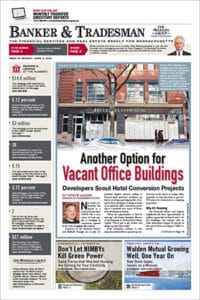Cambridge is on track to pioneer the elimination of parking requirements for residential buildings citywide in an effort to boost affordability. The entire state of California decided last week to do the same for projects within a half-mile of transit. This is a building trend that more Massachusetts communities should join.
On one level, the city’s action is a statement of principal. Fighting climate change demands we shift to greener ways of getting around, whether that’s via bus, subway, on a bike or on foot. And in cities or towns with as comprehensive transit service as Cambridge – or Somerville, Malden, Brookline, Boston Everett, Chelsea or many parts of Lynn, Quincy, Newton, Revere and Medford, for that matter – an able-bodied person doesn’t need to own a car to get by, even if they may rent one from time to time.
Eliminating parking requirements to help encourage a shift away from cars is one of many things Cambridge and its peers can do to strike a blow for the planet.
But it’s also a very practical way to help create cheaper forms of new housing, especially outside any city’s main commercial centers and deep in residential neighborhoods.
In their most basic form, they still take up space that could otherwise be ground-floor housing units. A small, 3-story multifamily building will largely cost the same to construct whether or not the developer is forced by law to tuck ground-level parking spots underneath its upper stories. Yet, the number of units over which the construction cost could be spread will be cut dramatically. And parking minimums – especially when combined with height limits – can mean the smallest lots may not be practically developable, at all.
Every parking space adds additional costs to a development, but this impact is most visible in large developments. When so many parking spots are needed, a garage above or below ground is the only option, the costs can easily run into the hundreds of thousands of dollars per parking space. In any city where one or even two parking spots are required per apartment or condominium, this translates directly to steep increases in prices and rents at a time where land, labor and materials cost more than ever.
As Banker & Tradesman covered last year, parking requirements are even a threat to the small retail spaces needed to keep neighborhood commercial nodes thriving. Especially on small or shallow lots, parking spots eat up so much space that it’s physically impossible to provide a home for the next great coffee shop or funky boutique.
Experience shows parking requirements actively make neighborhoods more congested and unpleasant. Somerville’s Assembly Row is a case in point. Despite being directly served by the MBTA’s Orange Line, its numerous parking garages draw in thousands of cars every day and leave its streets choked with traffic.
Let’s kick this 20th century mindset to the curb and get rid of parking requirements in transit-connected neighborhoods once and for all.
Letters to the editor of 350 words or less may be submitted via email at editorial@thewarrengroup.com with the subject line “Letter to the Editor,” or mailed to the offices of The Warren Group. Submission is not a guarantee of publication.






